#Sudanese Political Leader
Explore tagged Tumblr posts
Text
Wonder how far I can prod libs into finishing their full thought bubble behind all this "harm reduction" "genocide is a single issue" "you don't care about marginalized people in the US" "dyou want fascism WITH genocide???" screeching.
Okay, class, say it with me: "I don't want to live in a third world country like the ones we keep destroying."
Because you know. The countries your war criminal leaders keep bombing and starving and destabilising and leeching dry? We don't have trans or gay rights or women's rights or disability benefits or environmental or labour protections. No one would want to live in our countries obviously. You'd kill yourselves before you had to live like we do. Sure, we're only like this because you keep us trapped in poverty and violence and we still have full, happy lives worth living despite it but that's because we're used to it! We don't know any better! Not like you! You know what you deserve and you shouldn't have to lose anything as a consequence of your own political choices! Your government is supposed to happen to other people! Not you! So like, yeah, it's bad that the poors are being massacred wholesale or whatever, but like. That doesn't mean you gotta die with them, y'know? And by "death" you don't mean actual genocide like what's happening over here but "death" as in "having to live like we do".
The trolley problem metaphor is so goddamn attractive to you because you see yourself outside the tracks, objectively assessing the situation and making the "tough" "moral" choice for the collective good. It's imperialist horseshit. You don't have a democracy and it's not a trolley. What you have is an imperial death machine running on an apartheid system that decides who gets fed to it and who gets fed by it. That's your "two tracks"— the colonized and the colonizer, the core and the periphery, the white and the coloured. "Harm reduction"? Have you counted how many fucking millions in and around the world your death machine eats to keep how many of you "safe"? But our losses are a foregone conclusion, a matter of course, a regrettable necessity. The only variable is yours.
Every political choice in 200 years of your settler colony has been "genocide AND". "Genocide AND women's rights". "Genocide AND workers rights". "Genocide AND fascism". "Genocide AND democracy". The difference is that for the first time in your history you're now watching it livestreamed to the entire world in real time 24/7, exactly as your colony is about to capsize under the weight of its own bloodlust. A sea change from when your parents threw parties watching bombs dropping on Baghdad and then spent twenty years watching movies about sad it made the soldiers.
How do you count the victims when we are numbers and you are people? You scream about trans rights in the US while Palestinian trans children don't have the right to reach puberty. OSHA for you but Congolese children have to die in mines. Reproductive rights for the US while Sudanese women are raped in millions. Yes, but it's always been "genocide AND" no matter what, right? Do we want to sabotage the party that has never fucking cared about us and don't now even with half their own country screaming at them on the off-chance they might possibly maybe one day do?? Why are we acting so mad like it's YOUR fault that you're fighting for your quality of life over our corpses?? Do we want YOU to lose your rights over it??
Yes, actually. We do. We want you to have a taste of the reality that generations on generations of your illegal illegitimate white supremacist occupation has inflicted on us just so your worthless hide can sit there and call our genocides a single fucking issue. And let's be real: that's what you're so fucking afraid of.
803 notes
·
View notes
Text
ADRÉ, Chad—Abdussalam Mustapha and his friends used to play soccer for hours after school in El Geneina, a city in the West Darfur region of Sudan. But the 10-year-old can’t play anymore.
In April 2023, war came to Sudan. The Rapid Support Forces (RSF), a paramilitary wing of Sudan’s army, allied with other militia groups to perpetrate an ethnic cleansing campaign against non-Arab populations in and around El Geneina. Abdussalam and his entire extended family were forced to flee their homes on foot late at night, carrying only what they could hold in their hands.
On the way, the group was attacked. Abdussalam clutched the hand of his 5-year-old brother and ran. Suddenly, he felt a searing pain, and blood began pouring out of a gunshot wound in his stomach. The little fingers gripping his hand went slack. His brother had been shot in the head and died instantly. Now he was seated next to his mother on the floor of the family’s tented shelter in a refugee settlement in Chad.
Nearly 2 million Sudanese people have escaped to neighboring countries since the war started, and approximately 600,000 of them have fled to Chad. About 88 percent of the refugees are women and children. Some new arrivals have physical wounds. Almost all have emotional scars. After they cross the border, they are dependent on United Nations agencies and nongovernmental organizations (NGOs) to provide water, food, shelter, medical care, and basic supplies, such as soap, blankets, and buckets.
Despite efforts to raise money to respond to the crisis, the international community is falling far short of fundraising goals. On April 15, one year after the start of the war, world leaders and humanitarians met in Paris for an event intended to raise funds to support all U.N. agencies and aid organizations involved in the Sudan conflict response. $2.7 billion would go toward helping people in Sudan and an additional $1.4 billion would go toward supporting five refugee-hosting neighbors: South Sudan, Ethiopia, Egypt, the Central African Republic, and Chad. Of the total $4.1 billion required, only $2 billion was committed in Paris, an amount that was “really worrying” when considering that the amount of money that actually comes in is always less than what is committed at a pledging event, said Harpinder Collacott, executive director of Mercy Corps Europe.
Around the world, the need for humanitarian funding is outstripping the money that can be raised. Experts say that the problem is the funding model itself. A small handful of donor countries determine who and what gets the funding, which means that funding is based on the generosity of governments with political agendas. The system is voluntary, and governments sometimes make commitments that they don’t follow through on. Some crises captivate public attention more than others, and are therefore better funded, experts say. Others, like protracted conflicts in African countries, receive scant media attention and far less funding.
“I always go back to the [idea of the] tin can. Government and the UN, on behalf of the people in crisis, have to ask every single time for money,” said Michelle Strucke, director of the humanitarian agenda at the Center for Strategic and International Studies (CSIS), a Washington-based think tank. In terms of which crises get funding, “it almost seems whimsical from the outside.” The results are anything but.
The perpetrators murdered 38 members of Abdussalam’s family that night. “We were all running for our lives,” 30-year-old Mounira Oumar Mahamat Abdallah, Abdussalam’s mother, said tearfully. “Abdussalam was also shot. And was found by other people.” Those people brought Abdussalam to his mother. She hoisted him onto her back and started walking west. Abdussalam was delirious, drifting in and out of consciousness. The following day, they reached Adré, the Chadian border town that has become the busiest crossing point for refugees fleeing Darfur.
Abdussalam required multiple surgeries, so the family stayed in Adré while Médecins Sans Frontières (MSF), a nongovernmental organization that provides medical care in crises, operated on him six times. MSF has established a large clinic in the Adré refugee settlement, providing everything from medical checkups and vaccinations to mental health counseling for 300 to 500 refugees per day. It has also embedded in the Chadian government hospital in Adré, where surgeons can perform lifesaving surgery on patients like Abdussalam.
MSF’s medical and humanitarian programs in eastern Chad had expenses of approximately $22 million in 2023 and have a planned budget of about $41.5 million in 2024. To fill the gap left by other underfunded U.N. agencies and NGOs, MSF has rapidly deployed across the region, digging latrines, drilling boreholes, and serving hundreds of thousands of Sudanese as well as local Chadians. “We’ve responded massively in eastern Chad because the needs are acute, but we’re overstretched and carrying a heavier load than we should within the humanitarian aid sector,” said Avril Benoît, executive director of MSF USA.
At MSF’s pediatric ward in the hospital, dozens of emaciated babies and toddlers receive treatment for severe acute malnutrition, which affects brain development and increases mortality in children under five years. Despite the best efforts of doctors and nurses, three to four of these children die each week from malnutrition, said Sachin Desai, an MSF pediatrician.
Malnutrition has become one of the top concerns of humanitarians working in Chad. Before the war, Sudan was considered the “breadbasket” of Africa: Farming accounted for 60 percent of total national exports in 2022. But scorching, dry weather combined with missed harvests due to conflict means there is almost no food available in parts of Sudan today. Nearly 18 million Sudanese are facing acute hunger, and more than 5 million are experiencing emergency hunger levels in the worst conflict-affected areas, the World Food Program (WFP) says.
Today, both hunger and violence are driving migration. Once refugees reach Chad, they are registered and given WFP food ration cards. WFP organizes massive monthly food distributions, serving between 15,000 to 20,000 people per day. The April distribution was delayed by several weeks due to lack of funding, which also affected the quantity of the food the refugees received. They should get 2,100 calories per refugee per day, but in April, they got only 1,700 calories.
On a scorching April morning, thousands of women wearing colorful laffayas, traditional Sudanese dresses, sit patiently in long lines to receive their food rations. Maryam Ibrahim Saif Addine, stands out in a tattered black laffaya. The 35-year-old lost her husband to violence in Sudan and depends on rations to feed her seven children. Addine carefully measures out her portion of oil, beans, soap, salt, and cereals, which she will grind into flour to make porridge.
“I came here to wait for food early in the morning. I didn’t even take tea,” Addine said. “It’s still not enough. Sometimes, we have to sell our food to get some money and buy other things.”
Hundreds of thousands of refugees are now camped out in Adré along the border with Sudan. The newest arrivals have no shelter and sleep beneath scarfs propped up with sticks. They are exposed to the harsh desert elements, and lack food, water, medical care, and basic goods. With the rainy season fast approaching, aid workers say the conditions are ripe for a compounded humanitarian disaster. The rains will destroy the flimsy shelters, wash out the roads, and bring malarial mosquitoes, cholera, and other diseases. Getting refugees into semi-permanent shelters as quickly as possible is crucial to ensuring their safety.
Between July and December 2023, the U.N. High Commissioner for Refugees (UNHCR) relocated approximately 150,000 refugees from Adré to newly established settlements inland from the border.
“Finally, I was seeing the light at the end of the tunnel. Adré was starting to look again like a normal place,” said Laura Lo Castro, UNHCR’s Chad country director. Then, new waves of refugees began fleeing fresh outbreaks of violence. “Today, it looks the same as it did last July,” she said.
Today, another 170,000 refugees in Adré are waiting to be relocated. UNHCR has moved only 30,000 refugees in 2024 because of budget constraints. The agency wants to open a new site and relocate another 50,000 refugees, but it would cost approximately $17 million to build the necessary housing, water and sanitation infrastructure, and schools. “To be completely honest with you, I have no money to do that,” Lo Castro said.
Lo Castro is familiar with humanitarian emergencies. She helped refugees fleeing the Rwandan Genocide in 1994. Still, Lo Castro said the refugee crisis in Chad is one of the worst-funded emergencies she has ever worked on. The 2024 Sudan refugee response plan is only 8 percent funded. For Chad alone, $630 million is needed, but its part is only 6 percent funded. These numbers are in line with other major crises in the region: the Democratic Republic of Congo is also 8 percent funded, South Sudan is only 5 percent funded.
The problem is the international humanitarian funding model itself, which emerged from the ashes of World War II, when powerful nations came together to establish rules and institutions to regulate the global monetary system. The model, which was intended to help rebuild Europe, gave concentrated power to key stakeholder countries. Today, most international humanitarian responses are bankrolled by these influential top donors, including the United States, the European Union, and the United Kingdom.
“When you’ve got bilateral donors funding international humanitarian response, it’s always dependent on the political priorities of the donors on which one they will give to rather than others,” Collacott of Mercy Corps said.
The money often goes to the conflicts that suck up the most media attention. “When it bleeds it leads,” Strucke of CSIS explained. “If it’s a really high-profile conflict, or it’s a sudden onset disaster, like a catastrophic hurricane or earthquake situation, those get a lot of immediate attention, and that means the response plans are typically better funded.”
Inflation, rising costs, an increase in climate related disasters, and an increase in protracted conflicts around the world have created greater demand for humanitarian funding than ever before. The money feels less in part because of inflation and also because leading humanitarian donors are changing how they are using their dollars for assistance. Strucke said that some countries are repurposing parts of their budget that they would have used for development assistance towards border security instead. “And they think of it all as migration, but they’re actually doing a very dramatic shift in where the money is going,” Strucke said.
Diversification is key to improving the model, Collacott said. Receiving funding from more emerging market governments, such as India and Indonesia, private sector companies, and international NGOs could help combat the issue of not enough funding being concentrated in the hands of a few agenda setting countries. Funding must also be proactive, rather than reactive.
“We know every year there are going to be at least three new major global crises that we’re going to be fundraising for,” Collacott said. “We don’t want to be seeking funding after the crisis hits, but already have funding secured.”
Collacott floats the idea of a new humanitarian funding model based on three principles: all contribute, all benefit, all decide. “Until you make the connection that something happening miles away has a knock-on effect on your shores, people won’t see that this is a global conflict,” she said. “Crisis financing needs to be built on global public good, or we’re going to see the world destabilizing.”
59 notes
·
View notes
Text
by Peter Baum
Apart from financial corruption there was moral corruption in terms of indoctrination of children being part of the Arab political agenda and Islamic ideology and all knowingly facilitated by UNWRA for all those refugees under their responsibility. Terence Prittie and Bernard Dineen noted this in their 1973 report entitled The Double Exodus as did the noted Guardian correspondent at the time, Peter Niesewand. The 1973 report is clear and unambiguous in exposing the education curriculum’s vile antisemitic indoctrination in UNWRA run schools.
“Unfortunately, children have also been systematically taught in their schools to hate Israel and the Jewish people; UNWRA officials have admitted that there is much virulent anti – Israeli and anti -Jewish propaganda in their school text books . Five- and six-year-olds have been taught in their drawing classes to depict Israelis as monsters of cruelty and ugliness. UNWRA have not prevented the perverse political indoctrination of the very young refugees which has made a powerful contribution to the bitter and frustrated state of mind of much of the hard core of the refugee community”.
Lt. General Sir Alexander Galloway’s brief spell with UNWRA came to an abrupt end in 1952 when he was fired by the UN at the request of the Jordanian Government for saying – “The Arab states do not want to solve the refugee problem. They want to keep it an open sore, as an affront to the United Nations and as a weapon against Israel. Arab leaders don’t give a damn whether the refugees live or die’’.
If we study the financial contributions made to UNWRA, the results are startling. As at 1972 six Western nations had contributed US$ 735 million, the chief donor being the USA whereas all the five richest Arab nations combined had contributed US$ 8.5 million, a tad over one percent. Twenty-five years of western taxpayers contributing all and Arab Muslim countries ignoring the plight of their own and yet with the financial means to do so. If we extrapolate funding trends since the 1970’s to date then the percentages are not so extreme but still quite staggering. The USA is by far the largest contributor at 30 percent, the European Union, 25 per cent and Saudi around 20 per cent of total funds. Very recently many nations temporarily halted funding as a direct result of UNWRA’s contribution to terrorism in Gaza but have since, wrongly in my opinion, reinstated funding, the exception still being the USA.
In order to understand the financial perspectives of all this, a friend on Twitter or X now, who goes by the ‘Ebluemountain’ post name, statistically calculated, using the most recent UN data, that the actual UN budget is US$3.6 billion and UNWRA’s budget is US$1.6 billion. As one outstanding example the budget for Sudan is US$145 million which equates to US$2.80 per Sudanese whereas the Palestinians receive US$298 per individual – a multiple of nearly one hundred times. Palestinians are receiving 45 per cent of the UN budget Sudan less than one percent. In reality the United Nations deems the life of a Palestinian to be one hundred times more important than a Sudanese.
19 notes
·
View notes
Text
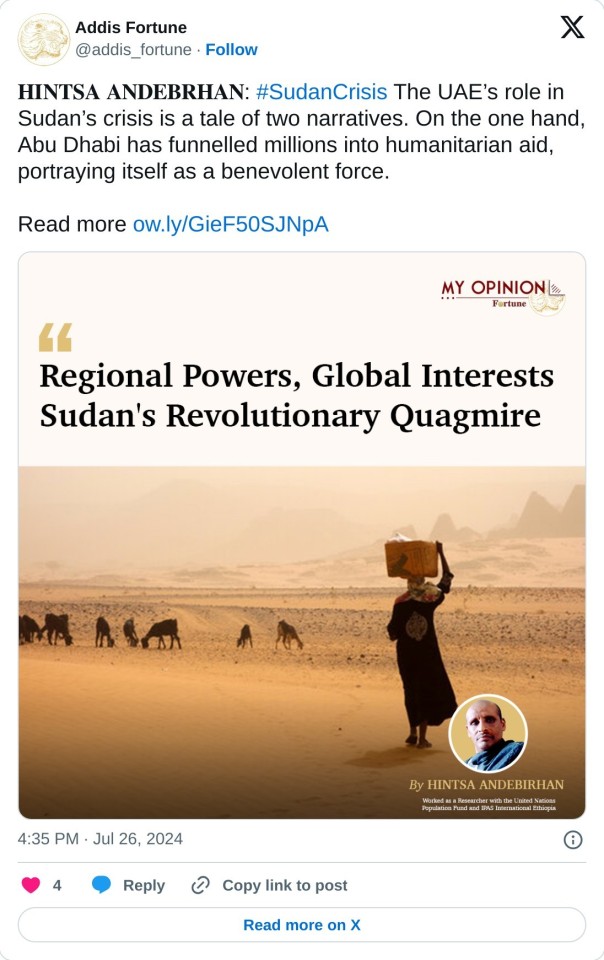
https://t.co/J3fEqiIOIk
Since June 2019, Sudan has been caught in a whirlwind of revolution, descending into a profound economic and political crisis. The initial optimism that followed President Omar H. al-Bashir's ousting has led to chaos, influenced by powerful international actors with their respective political agendas. The geopolitical quagmire is further complicated by the involvement of neighbouring countries.
Prime Minister Abiy Ahmed's (PhD) recent visit to Port Sudan, where he met with Abdel Fattah al-Burhan (Gen.), the head of the Sudanese army and the Saudi- and Egyptian-backed Sovereign Council of Sudan, evidenced Ethiopia’s vested interests. The visit should be particularly important given Abiy’s prior engagement with Mohamed Hamdan Dagalo, the Rapid Support Forces (RSF) leader, whom he hosted in Addis Abeba in December 2023 to advocate for peace in Sudan.
Ethiopia's economic ties with Sudan are substantial. The slowdown in the 211.5 million dollar investment circuit between Khartoum and Addis Abeba has adversely affected both countries. Small businesses along the Sudan-Ethiopia border have borne the brunt of the ongoing conflict. Prime Minister Abiy’s visit can be seen as an effort to stabilise these economic ties and promote peace for mutual benefit. However, if influenced by Western countries or Saudi Arabia, Abiy’s administration may face political backlash from its ally, the United Arab Emirates (UAE).
The role of international players was evident early on. The UAE was among several countries, including the United States (US), Israel, Saudi Arabia and Egypt, that expressed solidarity with the Sudanese people. Saudi Arabia and the UAE notably provided three billion dollars in economic aid to Al-Burhan’s leadership, signalling their approval of the political shift in Khartoum. However, the situation in Sudan soon deteriorated into an ongoing civil war, leading to accusations of ethnic cleansing and further international scrutiny.
Sudan's civil war, however, extends beyond regional dynamics. Recent reports have uncovered the involvement of external actors in perpetuating the conflict.
In May this year, American Senator Ben Cardin, chairman of the Senate Foreign Relations Committee, raised concerns about a UN Panel of Experts' report from the previous year, which provided evidence of the UAE supplying weapons to the RSF, a group notorious for its brutal tactics. US Ambassador to the UN, Linda Thomas-Greenfield, echoed these concerns, calling for “external actors" to stop "fueling and prolonging this conflict and enabling these atrocities by funnelling weapons into Sudan.”
Abu Dhabi has been working vigorously to clear its name in response to these accusations. Through diplomatic channels and humanitarian aid, the UAE has sought to counter allegations of its involvement in the Sudanese civil war. Hundreds of millions of dollars have been funnelled to humanitarian organisations operating in Sudan through various UN agencies, a move seen by many as an attempt by Abu Dhabi to portray itself as a force for good amidst the chaos.
Despite these efforts, a recent UN report has further implicated the UAE. The report exposed that the RSF, supported by Abu Dhabi, committed international crimes by receiving and laundering gold illegally exported from Sudan. The UAE has vehemently denied any involvement in Sudan’s political turmoil or illegal gold trade practices, calling the allegations a political mockery of its humanitarian generosity.
While these revelations add layers of complexity, the international community’s response remains lacklustre. The US and the UN have the political and diplomatic clout to influence the situation, but the resolution of Sudan’s crisis ultimately lies in the hands of its people. The international community can only play a supportive role in the Sudanese-led efforts to resolve the political disorder, providing the necessary space and resources for Sudan to shape its destiny.
Although belatedly, the Addis Abeba-based African Union (AU) has also begun addressing the dire humanitarian situation in Sudan. The Chairperson of the AU High-Level Panel on Sudan, Mohamed Ibn Chambas (PhD), has begun to speak out about the severe impacts of the ongoing civil war. However, stronger official condemnations from the AU were expected, holding all groups and countries involved in the war accountable.
Ironically, Sudan’s revolution is no longer a story of a failed uprising but an ongoing civil war marked by international intrigue and regional power struggles.
43 notes
·
View notes
Text

https://www.reuters.com/world/europe/russia-destroys-ukraine-launched-drone-flying-towards-moscow-mayor-says-2024-09-09/
15 notes
·
View notes
Text
Al Amal (Hope) is a new bimonthly newsletter produced by the Sudanese Anarchist Gathering, documenting issues and struggles of Sudanese Anarchists and conditions for Sudanese people. This bimonthly is issued jointly by the Sudan Anarchist Gathering, CNT-AIT France and their friends.
Excerpt:
Choosing to be an anarchist is an expression of true awareness of the failures of these systems. It is a consciousness that pushes you to the limits of both practical struggle and the deeply complex human experience. And this path leads to only two possible outcomes: you either survive as a true revolutionary resister, or you are consumed by the spiral of power.
Just as authority in Sudan takes many forms, so does opposition. There are political resistance movements, parties, mercenary armed groups, so-called revolutionary and liberal militias built on tribal structures, and cultural factions engaged in deep propaganda-driven authoritarianism.
These intertwined hierarchies form the crises of Sudanese peoples. Sudan is, in reality, a collection of small peoples trapped within a state that wields brutal power, recognizing no human rights beyond its own interests.
[...]
For decades, Sudanese anarchists have critically analyzed the role of tribalism and its dominance, tracing its impact from the early days of small warring tribal states, through the colonial era’s reliance on tribal alliances, to its current status as a driving force behind Sudan’s persistent conflicts.
While tribalism remains central to the ongoing war and its continuation, Sudanese political forces often address this issue with hesitance, constrained by either political ties to tribes or fear of confronting tribal authority.
[...]
The tribe is a miniature form of social authority that possesses its own authoritarian culture and is governed by the authority of a tribal leader or chief, characterized by a hereditary transfer of leadership in most cases. It has been and continues to be the main obstacle in transforming the Sudanese people from a center of tribal conflict, violence, and immersion in ignorance and backwardness to a better stage.
Colonialism contributed to shaping hostilities between tribes by distinguishing some from others and arming them, granting them state authority, which formed complex coalitions of diverse human groups in even the simplest communal matters.
[...]
The contemporary problem of Sudan, which is exploited by imperialist forces to control its strategic location and vast resources, is the formation of armed movements and militias based on ethnic and racial grounds in an attempt to divide and fragment the country for easier control.
[full jan-feb 2025 issue pdf download here]
3 notes
·
View notes
Text
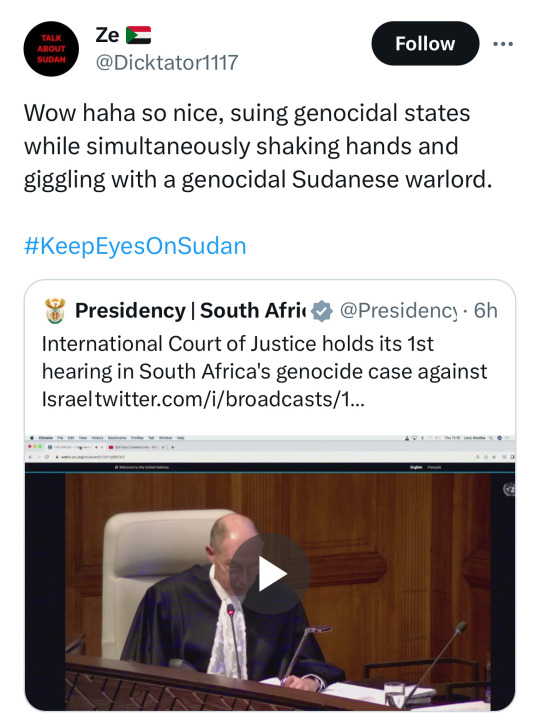
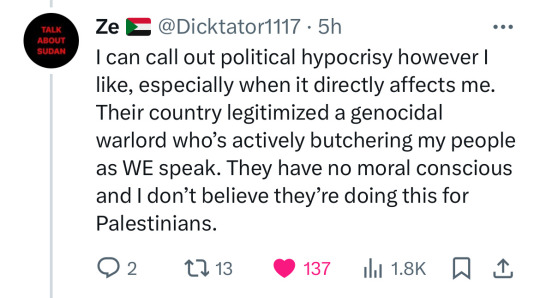

Presidency of South Africa twitter, "International Court of Justice holds its 1st hearing in South Africa's genocide case against Israel" (Ze🇸🇩 in reply to Presidency of South Africa twitter): Wow haha so nice, suing genocidal states while simultaneously shaking hands and giggling with a genocidal Sudanese warlord. (Ze🇸🇩 in thread): I can call out political hypocrisy however I like, especially when it directly affects me. Their country legitimized a genocidal warlord who’s actively butchering my people as WE speak. They have no moral conscious and I don’t believe they’re doing this for Palestinians. (@Kandakat_alhaqq): Did you guys know that Omar Al-Bashir was wanted by the ICC for a genocide when he visited SA in 2015, the same crimes South Africa is suing Isnotreal for and SA refused to arrest him? Did you know that SA met with Hemeti, general of the RSF militia that’s committing all sorts of atrocities just last week? Did you know they called him “President” on a tweet and then deleted it? Did you know Hemeti is also complicit in the same genocide (Darfur) Omar Al-Bashir was wanted for by ICC? No? Well now you know. While SA plays hero in front of the world, they most certainly are not for the Sudanese people.

(Above picture, image description by The East African; Leader of Sudan's paramilitary Rapid Support Forces (RSF) Mohamed Daglo (left) when he visited South African President Cyril Ramaphosa at his official residence in Pretoria on January 4, 2024): Sudan paramilitary leader [RSF] holds talk with [South Africa's] President Ramaphosa
#sudan#keepeyesonsudan#south africa#icc#geopolitics#geopol#note: sorry for not including @kandakat_alhaqq's twitter name or heading#the characters would not work and kept formatting to arabic#so the emojis wouldn't work as i wanted them to
28 notes
·
View notes
Text

1-UAE!!
Under the guise of saving refugees, the United Arab Emirates is running an elaborate covert operation to back one side in Sudan’s spiraling war supplying powerful weapons and drones, treating injured fighters and airlifting the most serious cases to one of its military hospitals, according to a dozen current and former officials from the United States, Europe and several African countries.
The operation is based at an airfield and a hospital in a remote town across the Sudanese border in Chad, where cargo planes from the Emirates have been landing on a near-daily basis since June, according to satellite imagery and the officials, who spoke on the basis of anonymity to discuss sensitive intelligence.
Despite strained Sudan-UАЕ relations, gold shipments flowed freely from Sudan to Dubаi, with exports facing no obstacles and operating with official approval in Port Sudan. Political tensions didn't disrupt the lucrative trade, which continued despite the December 2023 expulsion of diplomats and accusations of smuggling.
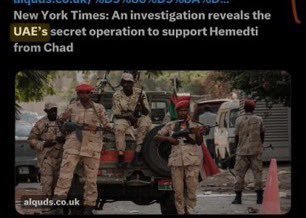
2- Russia (Wagner group)
The Russian mercenary group Wagner has been supplying Sudan’s Rapid Support Forces with missiles to aid their fight against the country’s army, Sudanese and regional diplomatic sources have told the CNN.
The sources said the surface-to-air missiles have significantly buttressed RSF paramilitary fighters and their leader Mohamed Hamdan Dagalo as he battles for power with Gen. Abdel Fattah al-Burhan, Sudan’s military ruler and the head of its armed forces.
(Reports years ago claimed the hemedti smuggles gold to Russia)
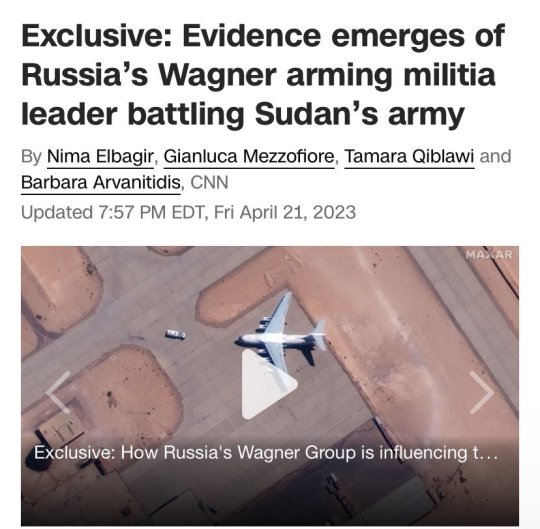
3- Libya
The eastern Libya strongman, Libyan National Army (LNA) commander Khalifah Haftar, has actively backed the paramilitary Rapid Support Forces (RSF) against the Sudanese military and armed forces in the ongoing fighting in Khartoum and its surrounding environs.
Haftar calculates that an RSF victory in the Sudan power struggle would secure valuable trade and smuggling routes through Sudan.
By supporting the RSF, Haftar is aligned with the United Arab Emirates (UAE) and the Russian mercenary Wagner Group.
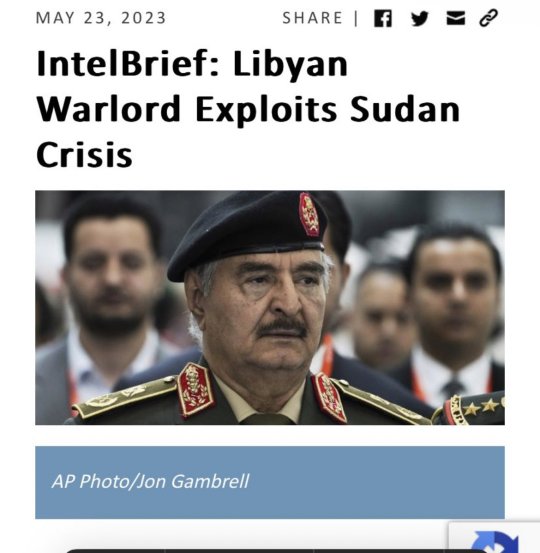
4- Chad
Chadian sources said that the Chadian transitional government is building a new military base or depot 6-7 kilometers north of the city of Abéché in Wadaday state, with full funding from the UAE to support the Rapid Support Militia.
Mobilization campaigns and movements are now underway to prevent this criminal operation carried out by the Chadian government against citizens, with funding from the UAE, to destroy Sudan.
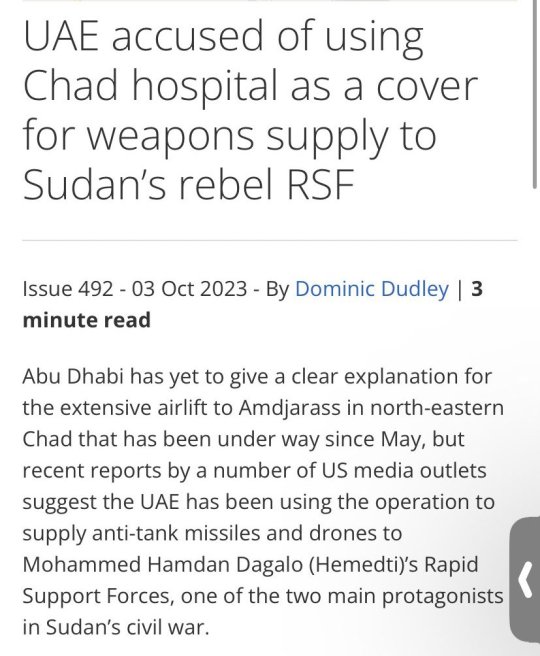
5- Ukraine
In September 2023, CNN reported that Ukrainian special services were behind a series of drone strikes and a ground operation near Sudan's capital, Khartoum, which targeted Rapid Support Forces (RSF), a militia backed by the Wagner Group, a Russian mercenary outfit.
6- Israel
There has been evidence that Israel is also sending supplies to the RSF. Israel wants to curb Iran's expanding influence in the region, while halting human and arms smuggling routes from Sudan to Gaza. Better relations with Sudan would also enhance Israel's ties with other African countries, helping it to gain access to African markets, especially after the suspension of Israel's observer status in the African Union.
Also using Sudan’s war for cheap propaganda and diverting attention from their atrocities in Gaza by claiming that Hamas Is tied to the RSF. Hemedti tried to organize a secret meeting with officials from the Israeli Mossad without the knowledge of the government and the Sudanese army in Khartoum,on January 2022, but he was forced to inform the army of the meeting in the end, after Israel announced.
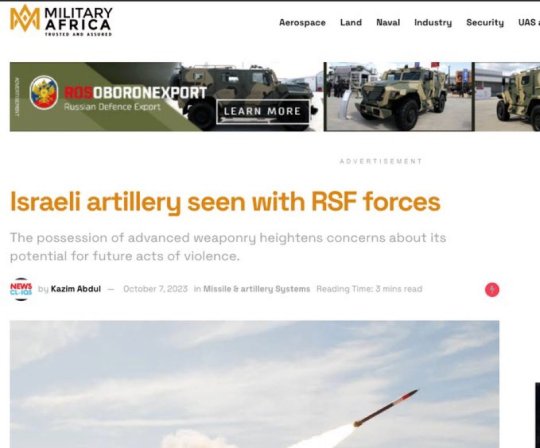
7- Iran
Media reports said Iran has supplied Sudan's army with combat drones. The army has not denied the claims. Later, Sudan's Foreign Minister visited Tehran and held talks with high ranking officials as part of the two countries' efforts to restore their diplomatic relations.
8-The EU
The European Union has been accused of "hiding" the impact of its funding of the Sudanese government and its paramilitary forces as part of a programme to stem the flow of migrants from Africa to Europe. Though the EU claims it provides no funding to the government, activists and researchers say otherwise, arguing the organisation's migration initiatives also benefit, at least indirectly, the country's notorious Rapid Support Forces (RSF) paramilitary group.

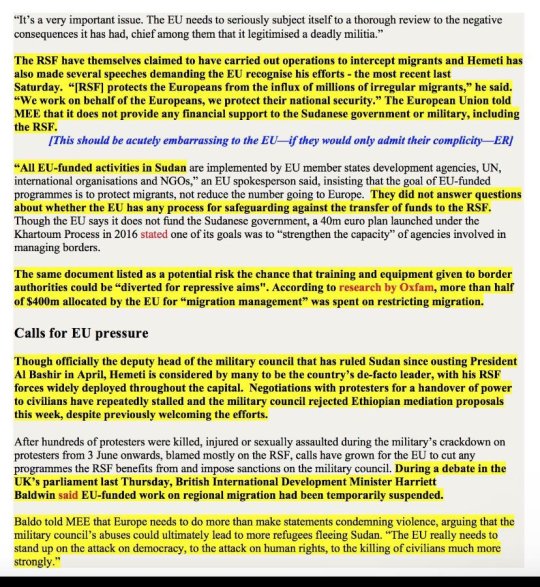
9- The US
During the transitional period, there were long bread lines, and sometimes people had to wait for days to get gas. And that could have been avoided if:
1) The U.S was quicker in getting Sudan off the state sponsor of terror list which blocked it from much of the global economy. It was particularly insulting that they demanded that the only way to do that was to 'normalise' relations with Israel.
2) If the U.S wasn't insisting that the government (which arose because the Sudanese people overthrew Bashir's regime) pay reparations to the U.S for an attack that they had nothing to do with.
3) If the IMF didn't force Sudan to cut fuel and bread subsidies to get debt relief after Bashir's overthrow. One of the triggers for the 2018 revolution was that Bashir was also forced to do this. It made life miserable.
10- Saudi Arabia
The Saudis and Emiratis have turned to battle-hardened forces from Sudan with combat experience in Darfur and other parts of their country. In fact, 8,000-14,000 Sudanese mercenaries including child soldiers between the ages of 13 and 17.
Many of the Sudanese fighters in Yemen come from the Janjaweed (armed horsemen) RSF militias made up of ethnic Arabs from western Sudan, eastern Chad, and the Central African Republic (CAR).
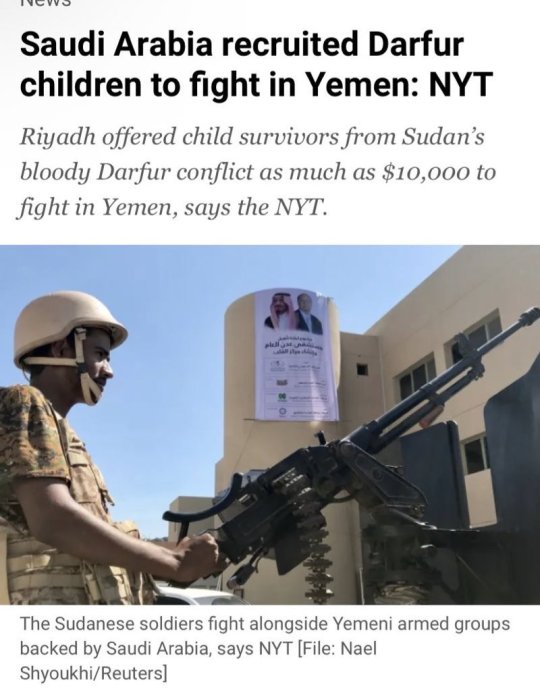

#sudan#rsf#rapid support forces#uae#united arab emirates#russia#wagner group#libya#chad#ukraine#israel#iran#european union#united states#saudi arabia#genocide
8 notes
·
View notes
Text
As TNC’s second biggest hater (behind Cornel West), i’m like flabbergasted at the reaction to his liberal zionist “october 7 was horrific/barbaric but what israelis are doing is jim crow” line is receiving.
Jamaal Bowman (whom i loathe) was ousted in his primary by gerrymandering and the most expensive negative media blitz for a primary election backed by AIPAC.
Momodou Taal was almost expelled from cornell and thus nearly deported for being proPalestinian.
The early targets of Adam Guillette’s doxxing van were Black women leaders of various college ProPalestine encampments (who for obvious reasons i’m not naming)
AND YET!! the libidinal economists who peddle antiBlackness as the supreme form of suffering are nowhere to be found speaking against this antiBlack violence.
And sure Palestinians are antiBlack just like everyone else including Black people, by the way.
But the difference here is that Palestinians do not have the power to weaponize the entire state media and political apparatuses to bear down on single, individual Black persons.
“well Motaz joked that because Palestinians aren't Black how is it that someone sent Sudanese relief to Gaza” is in no way comparable to universities training snipers on Black students.
And i say this not for the salvation of the Palestinians but for our sake.
the Palestinians are antiBlack line is so overplayed by the hasbarists that ppl are getting confused when there is a legitimate accusation of antiBlackness and when it’s propaganda. Including the APs themselves. At the same time, it's so obvious a psyop that white people are starting to joke about it.
And you can say that such jokes are antiBlack. And that's my point! Not only is Palestinian antiBlackness used to manufacture consent for the genocide, it is also at the same time a way to delegitimatize how Black people talk about our oppression so that people who already have a hard time believing us, now think of our oppression as a literal psyop.
Congratulations. You played yourself.
6 notes
·
View notes
Text

Prime Minister Abdel Fattah al-Burhan (July 11, 1960) was born in Gandatu, Sudan. He was educated in local schools and joined the military as a young man. He rose through the ranks and in the early 2000s he was posted in the Darfur region as a senior commander fighting the rebels. He worked with the leader of a paramilitary group, Mohammed Hamdan Dagalo, coordinating joint actions against the Darfur fighters. He oversaw the Sudanese troops fighting in Yemen’s civil war on behalf of the Saudi-backed faction. He was appointed Chief of Staff of the Sudanese army.
On April 11, 2019, the Sudanese army acted. President Bashir was arrested and was chosen to head the transitional military council with Mohammed Hamadan Dagalo as vice-chair. Many protesters felt military and senior figures in his regime remained in control of the country. On June 2, 2019 security forces along with Hemedti’s Rapid Support Forces paramilitary attacked protesters in Khartoum who were demanding elections. Over 100 protesters were killed and dozens of women were raped.
In August 2019 a Sovereign Council was established to appease the protestors. The council was composed of military and civilian leaders to jointly rule Sudan and prepare the country for a return to civilian rule and national elections in 2023. He was selected as the head of the council. A civilian, Abdallah Hamdok, was appointed Prime Minister on August 21.
Tensions between the civilian and military authorities reached a climax in October 2021. Hamdok was kidnapped and the military took complete control of the government. International pressure on the Sudanese military and pro-democracy protests within Sudan led to the announcement that all political prisoners were to be freed and Hamdok was freed and reinstated in power. The military caused him to resign as Prime Minister on January 2, 2022.
Since the coup, the US, the World Bank, and the International Monetary Fund have halted the flow of nearly $1.5 billion in aid to Sudan. The currency is in freefall and the official inflation rate is 260%. Nine million of the forty-four million Sudanese face acute hunger. #africanhistory365 #africanexcellence
3 notes
·
View notes
Text
In February 2022, Dagalo, also known as Hemedti, visited Moscow as part of the long-running relationship between his Rapid Support Forces (RSF) and Russian backers — most notably Wagner Group mercenaries. Wagner mercenaries have trained RSF members, and the two groups jointly operate a gold mining company through which Wagner has smuggled hundreds of tons of gold out of the country.
“Hemedti’s trip abroad … burnished his international profile and gave Russia access to a key Sudanese figure with whom it had not previously engaged in any meaningful way,” Sam Ramani, a former a tutor of Politics and International Relations at the University of Oxford, wrote in an analysis for published by the Middle East Institute.
Hemedti returned from the trip pledging deeper ties with Russia and raising the possibility of Russia opening a naval base on Sudan’s Red Sea coast.
Experts say Russia is working to make sure Sudan stays in the hands of military rulers.
“The Kremlin has always preferred Sudan to have an authoritarian government that can make deals without civilian oversight or transparency,” Amgad Fareid Eltayeb, an analyst and former assistant chief of staff in 2020-2021 to then-Prime Minister Abdalla Hamdok, wrote for the European Council on Foreign Relations.
Throughout 2022, Hemedti and coup leader Gen. Abdel Fattah al-Burhan, head of the Sudan Armed Forces, were part of negotiations intended to shift Sudan toward democratic rule. The first phase of that process ended with the December signing of the Framework Political Agreement (FPA) calling for a fully civilian-led government with no military involvement. The FPA proposal is a departure from the joint military-civilian Sovereignty Council that ruled after the ouster of dictator Omar al-Bashir — and ultimately ended in a coup just as civilians were set to take over.
38 notes
·
View notes
Text
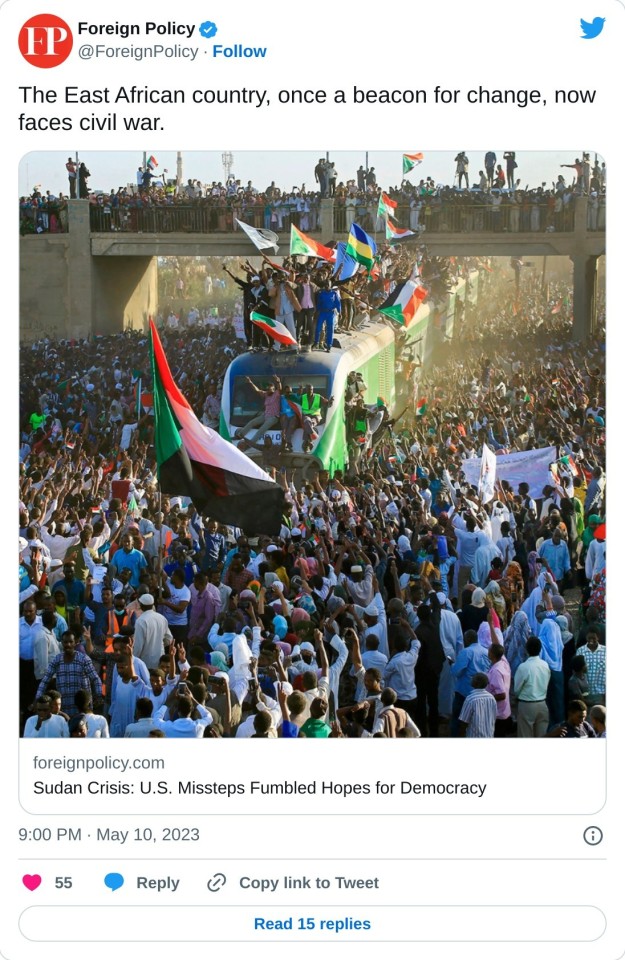
In late October 2021, a top U.S. envoy met with Sudanese military commanders and Sudan’s top civilian leader to shore up the country’s precarious transition toward democracy. The generals assured Jeffrey Feltman, then the U.S. special envoy for the Horn of Africa region, that they were committed to the transition and would not seize power. Feltman departed the Sudanese capital of Khartoum for Washington early on the morning of Oct. 25. En route, he received news from Sudan: Hours after he left, those military leaders had arrested the country’s top civilian leaders and carried out a coup.
For the next 18 months, Washington adopted a series of controversial policy measures to both maintain ties with the new military junta and try to push the East African nation back toward a democratic transition. Months of work led to a new political deal that offered, on paper at least, new hope, and some Biden administration officials felt they were tantalizingly close.
But the deal blew up in the eleventh hour as violence erupted across Khartoum last month between forces controlled by the rival generals, Abdel Fattah al-Burhan, who leads the Sudanese Armed Forces (SAF), and Mohamed Hamdan “Hemeti” Dagalo, the head of the powerful Rapid Support Forces (RSF) paramilitary group.
The collapse of Sudan’s democratic transition has led to anger and backlash in Washington among diplomats and aid officials, some of whom feel that the Biden administration’s policies empowered the two generals at the center of the crisis, exacerbated tensions between them as they pushed for a political deal, and shunted aside pro-democracy activists in the process.
“Maybe we couldn’t have prevented a conflict,” said one U.S. official who spoke on condition of anonymity. “But it’s like we didn’t even try and beyond that just emboldened Hemeti and Burhan by making repeated empty threats and never following through.”
“And all the while,” the official added, “we let the real pro-democracy players just be cast to the side.”
The conflict between Burhan’s and Hemeti’s forces turned Khartoum overnight into a battle zone that put millions of citizens, as well as U.S. and foreign government personnel, in the crossfire of firefights, airstrikes, and mortar attacks. The fighting has pushed Sudan toward the brink of collapse and undermined, perhaps permanently, a Western-funded project to bring democracy to a country beset by autocracy and conflict for half a century.

People run and walk through the streets in front of an armored personnel carrier as fighting in the Sudanese capital of Khartoum continues between Sudan’s army and paramilitary forces on April 27. AFP via Getty Images
As successive rounds of cease-fires fail, Western officials and analysts increasingly fear that the fighting could lead to a full-scale civil war, bringing a new vacuum of instability and chaos to a region already suffering humanitarian crises and along the strategic Red Sea, through which 10 percent of global trade flows.
“The way things are going, Sudan begins to resemble a massive Somalia of the early 1990s on the Red Sea, a total state breakdown, if the fighting doesn’t stop,” said Alexander Rondos, a former European Union envoy for the Horn of Africa.
Interviews with about two dozen current and former Western officials and Sudanese activists close to the negotiations describe a deeply flawed U.S. policy process on brokering talks in Sudan in the run-up to the conflict, monopolized by a select few officials who shut the rest of the interagency team out of key deliberations and stamped out a growing chorus of dissent over the direction of U.S. Sudan policy.
“From the outset, there was a consistent and willful dismissal of views that questioned whether the U.N. talks would be a recipe for success or for failure,” said one former official familiar with the matter. “Those warnings were ignored, and instead the U.S. built a dream palace of a political process that has now crashed down on the people of Sudan.”
Current and former U.S. officials, many of whom spoke on condition of anonymity, said internal warnings of roiling tensions in Khartoum and a possible conflict were dismissed or ignored in Washington, setting the stage for U.S. government personnel to be trapped amid the fighting in various parts of Khartoum with no advance preparations to move them to safety. In Khartoum, these officials and Sudanese analysts said, the policy was further hampered by an embassy that was for years understaffed and out of its depth, without even an ambassador for much of the crucial period.

A woman inside her house protects her face from tear gas in the Abbasiya neighborhood of Omdurman, Sudan, on Nov. 13, 2021. Organizations called for civil disobedience and a general strike during demonstrations against the military coup. Abdulmonam Eassa/Getty Images
“We seemed to have lost all institutional memory on Sudan,” said Cameron Hudson, a senior associate at the Center for Strategic and International Studies and former State Department official. “These generals have been lying to us for decades. Anybody who has worked on Sudan has seen this stuff play out time and time and time again.”
The U.S. State Department has sharply disputed these characterizations. “U.S. engagement after the October 2021 military takeover was centered on supporting Sudanese civilian actors in a Sudanese-led process to re-establish a civilian-led transitional government,” a State Department spokesperson said in response.
“The United States did not press for any specific deal but tried to build consensus and put pressure on the key actors to reach agreement on a civilian government to restore a democratic transition,” the spokesperson said and added that those efforts included “near constant diplomacy, often working closely with civilians, to defuse tensions between the SAF and RSF that arose multiple times and again emerged in the days before April 15, 2023,” when the fighting began.
Still, for an administration that has made promoting global democracy a centerpiece of its foreign policy, many government officials who spoke to Foreign Policy contended that Sudan could stand as one of the starkest foreign-policy failures, even in the wake of the successful evacuation of all U.S. government personnel and campaign to help U.S. citizens escape the country.
These officials also fear that the crisis could reverberate well beyond Sudan’s borders if the warring sides don’t agree to a viable cease-fire soon, with the risk of rival foreign powers exacerbating the conflict and transforming it into a proxy war.
Interviews with multiple Sudanese activists and civil society leaders, meanwhile, paint the picture of a pro-democracy movement that has completely lost faith in the United States as a beacon for democracy and supporter of Sudan’s own democratic aspirations. Many spoke on condition of anonymity for fear of their safety as fighting continued in Khartoum.
“Either the U.S. and West properly step up or they just need to fuck off because halfhearted steps and empty threats of sanctions, again and again and again, are doing more harm than good,” said one Sudanese person deeply familiar with the internal negotiations. “Our trust in the U.S. is entirely gone.”
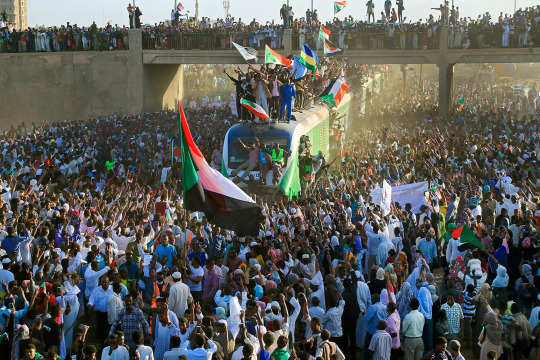
Sudanese protesters cheer on arriving to the town of Atbara from Khartoum on Dec. 19, 2019, to celebrate the first anniversary of the uprising that toppled Sudanese dictator Omar al-Bashir. Ashraf Shazly/AFP via Getty Images
After a popular pro-democracy uprising ousted longtime dictator Omar al-Bashir in 2019 and set the stage for Sudan to rejoin the international community after decades as an international pariah, the United States invested countless diplomatic resources and hundreds of millions of dollars in Sudan’s democratic transition.
Sudan seemed poised to be a success story. A popular uprising, led in many ways by Sudanese women, had ousted one of the world’s most notorious dictators. U.S. President Joe Biden in a major U.N. speech in September 2021 denounced the global rise of autocracy and touted Sudan as one of the most compelling contrasts to that trend worldwide after the 2019 revolution. In Sudan, he said, there was proof that “the democratic world is everywhere.”
Just a month later, Burhan and Hemeti orchestrated their coup. Afterward, the Biden administration froze some $700 million in U.S. funds to aid in the democratic transition and, over a year later, issued visa restrictions on “any current or former Sudanese officials or other individuals believed to be responsible for, or complicit in, undermining the democratic transition in Sudan.” The World Bank and International Monetary Fund also froze $6 billion in financial assistance.
But some U.S. diplomats felt that didn’t go far enough and none of those reprisals would directly affect Burhan or Hemeti. A fierce internal debate unfolded. Some officials argued that Washington needed to roll out punishing sanctions against Burhan and Hemeti to bring them to heel and show support for pro-democracy activists. Other officials, including Assistant Secretary of State Molly Phee—Biden’s top envoy for Africa—argued that sanctions wouldn’t be effective and might undermine U.S. influence with Burhan and Hemeti as they sought to bring them back to the negotiating table.
“There was the right thing to do, to show the Sudanese people we were all-in on democracy, to punish Hemeti and Burhan for this blatant coup, and then there was the wrong and slightly more expedient thing to do, [to] just keep working with them after some stern finger-wagging,” said one U.S. official involved in the process. “We chose door number two.”
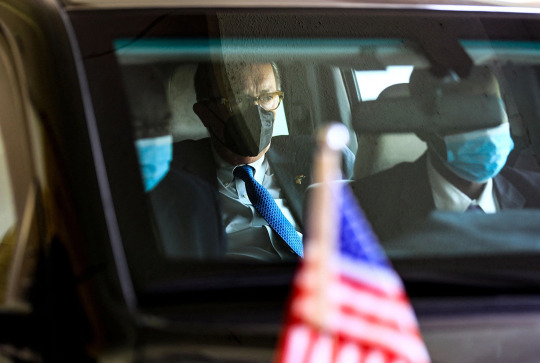
Jeffrey Feltman, the U.S. special envoy for the Horn of Africa, leaves after meeting with Sudanese Prime Minister Abdalla Hamdok in Khartoum on Sept. 29, 2021. Ashraf Shazly/AFP via Getty Images
Feltman, the former U.S. envoy, said he advocated for sanctioning Burhan and Hemeti during his time in government but in hindsight wasn’t sure if it could have prevented the conflict. “Do I think sanctions ultimately would have prevented them from eventually taking 46 million people of Sudan hostage because of their personal lusts for power? No.”
There were other complicating issues as well. Senior Biden administration officials working on Africa policy were consumed by the war in neighboring Ethiopia, where an estimated 200,000 to 600,000 people died during a bloody conflict in the country’s northern Tigray region. And the U.S. Embassy in Khartoum was understaffed and unable to come to grips with the situation; a full-time U.S. ambassador wouldn’t arrive until three years after Bashir’s ouster. During this time, officials say, Phee took direct charge over U.S. policy on Sudan.
Phee worked closely with a U.S. Agency for International Development official detailed to the State Department, Danny Fullerton, in Khartoum to negotiate directly with Burhan and Hemeti and bring them to the table for a new political deal.
“The embassy was just very beleaguered, with a real shortage of skilled or enough political officers, and both the chargés d’affaires and later the ambassador when he got there were very frustrated with a lack of support from Washington,” said one American familiar with internal embassy dynamics. “It was a group that was out of its depth, overly busy, and, frankly, not as well connected as it should’ve been with the right people in Sudan’s pro-democracy communities.”
This official said severe embassy staffing shortages, detailed in a State Department watchdog report on the embassy published in March, and leadership issues contributed to difficulties in hashing out negotiations with Burhan and Hemeti. But other current and former officials dispute that, insisting that the State Department can still make deals with high-level involvement from officials in Washington, even with an understaffed embassy.
Five current and former U.S. officials and two Sudanese activists familiar with the negotiations said that before the U.S. ambassador came to Khartoum in late 2022, U.S. officials involved in the negotiations with Hemeti and Burhan didn’t do enough to incorporate Sudan’s pro-democracy resistance committees into deliberations on a new political deal with the two generals, nor did they heed warnings about the inherent risks and flaws in a new deal.
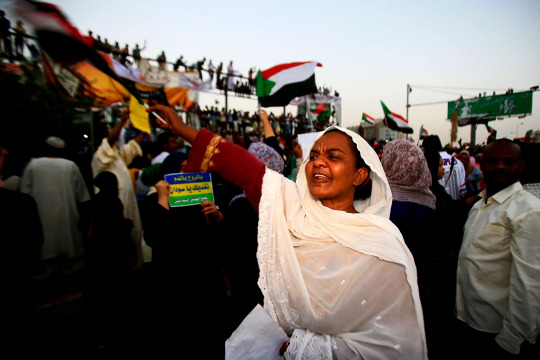
A Sudanese woman chants slogans and waves a national flag during a demonstration demanding a civilian body to lead the transition to democracy outside the army headquarters in Khartoum on April 12, 2019. Ashraf Shazly/AFP via Getty Images
These officials said there was mounting dissent in Washington over the trajectory of U.S. policy but that Phee dismissed other policy options, including threatening Hemeti or Burhan with sanctions or other forms of pressure or incorporating Sudan’s pro-democracy groups into the political negotiations. The State Department watchdog report also noted that the deputy chief of mission in Khartoum “at times remained focused on her predetermined course of action and did not consider alternatives offered by staff”—though the report did not address whether this had any affect on U.S. policy.
The State Department spokesperson, however, sharply disputed these characterizations: “While we cannot comment on internal policy deliberations, State Department leaders carefully considered policy proposals and different opinions on our policy on Sudan and did not dismiss or stamp out any dissent.”
All the while, Burhan and Hemeti sought to expand their own power and influence across Sudan, currying favor with foreign powers and setting the stage for a growing rivalry that would later ignite a deadly conflict. Burhan found backers in neighboring Egypt. Hemeti courted the United Arab Emirates and Russia and began deepening ties between the RSF and the Wagner Group, a shadowy Russian mercenary outfit widely reported to be responsible for war crimes in other parts of Africa and in Ukraine. Hemeti, implicated in widespread atrocities in Sudan’s Darfur conflict that broke out in 2003, launched a coordinated public relations campaign to try to transform himself into a statesman on the world stage in what was seen as a political charm offensive and challenge to Burhan’s rule.
Hemeti visited Moscow on Feb. 23, 2022, on the eve of Russia’s full-scale invasion of Ukraine, to discuss the possible opening of a Russian port on Sudan’s coast along the strategic trade routes in the Red Sea. Some U.S. officials who had been pushing for sanctioning Hemeti believed his brazen visit to Moscow would finally convince top decision-makers to finally pull the trigger on a major new tranche of sanctions. The sanctions never came.
Around that time, at least one memo was written and circulated within the State Department’s Bureau of African Affairs warning of the risks of current U.S. policy on Sudan and listing potential scenarios that could emerge from the rivalry between Burhan and Hemeti, including those tensions erupting into a full-scale conflict. The memo, described in broad terms by several congressional aides and former officials familiar with it, was meant to go to U.S. Secretary of State Antony Blinken’s desk, but the draft was heavily edited, watered down, and never passed out of the bureau, those people said. “Still, the State Department leaders can’t say they weren’t warned,” one former official said.
Human rights advocates have also criticized the Biden administration’s approach to Sudan in the months leading up to the eruption of violence in April. “By repeatedly failing to hold abusive leaders accountable or making clear, through concrete measures, that abusive behavior would not be condoned, Sudan’s Western partners sent these generals the signal that they can continue holding the country at a gunpoint with almost no consequences,” said Mohamed Osman, an expert on the region at Human Rights Watch.
During this time, Sudanese activists became increasingly disenchanted with the U.S. approach to Sudan. “There was no meaningful commitment that we’d ever seen from either [Burhan or Hemeti], and that was all put aside and sacrificed effectively at the altar of a political process and a political agreement that was never going to hold and that had very little popular support,” said Kholood Khair, a Sudanese political analyst who followed the negotiations closely.

John Godfrey, the U.S. ambassador to Sudan, delivers a speech in Port Sudan amid the delivery of tons of corn as part of U.S. humanitarian support for the country on Nov. 20, 2022. AFP via Getty Images
In September 2022, John Godfrey, a career U.S. diplomat with experience in the Middle East and North Africa and a background in counterterrorism, landed in Khartoum as the first U.S. ambassador to Sudan in a quarter century. Godfrey, officials said, immediately began trying to make inroads with so-called resistance committees and other civil society organizations that had been the driving force in Sudan’s push for democracy.
“He was beset with the cards that were dealt to him,” the American familiar with the embassy’s internal dynamics said. “He was burning the candle at both ends trying to make this deal happen, even if people back in Washington, outside of Phee and the [Bureau of African Affairs], weren’t giving Sudan much attention or thought.”
Even as Russia’s war in Ukraine and the ongoing conflict in Ethiopia distracted most in Washington, Phee and Godfrey—alongside counterparts including senior diplomats from the United Kingdom, United Nations, African Union, and a regional bloc called the Intergovernmental Authority on Development—pushed to restart Sudan’s transition to civilian rule. An apparent breakthrough came last December, when Sudan’s military leaders and some factions of the country’s pro-democracy forces agreed to a new civilian-led transitional government in a matter of months.
But the Western negotiators acceded to demands by Hemeti and Burhan to cut civil society and pro-democracy activists out of the negotiations, giving the military junta an early win over the weaker civilian groups, officials said. The December agreement also left unresolved one major issue that would soon become an explosive one: plans to incorporate the RSF into the SAF to create one unified military force for the country.

People gather to protest the framework agreement signed by Sudan’s military and civilian leaders, which aims to resolve the country’s governance crisis, in Khartoum on April 6. Mahmoud Hjaj/Anadolu Agency via Getty Images
That question fueled more tensions between Burhan and Hemeti in the coming months. Analysts in Khartoum began sounding alarm bells about the roiling tensions that would set the stage for an eruption of violence. The push for the agreement may have exacerbated it.
“There was this absolute desperation to push the final deal over the line to the point of succumbing false hope,” said another person involved in the negotiations.
In Washington, however, plans were underway to celebrate the new transitional government the second the agreement was signed. The embassy continued arranging meetings with Hemeti and Burhan and conducting routine embassy business; an American rock band played a festival in March as part of a State Department public diplomacy tour.
The business-as-usual approach belied the tensions in Khartoum. A signing ceremony for the deal was delayed and then delayed again. Burhan and Hemeti were amassing forces around Khartoum. Some low-level U.S. diplomats and Sudanese civilian negotiators began more explicitly warning their friends and colleagues back in Washington through informal back channels that a conflict seemed imminent.
“People were calling around, saying, ‘You’ve got to pass up these messages to everyone you know in D.C. that there could really be a war, it doesn’t feel like the international community is taking us seriously’” said the American familiar with internal embassy dynamics.
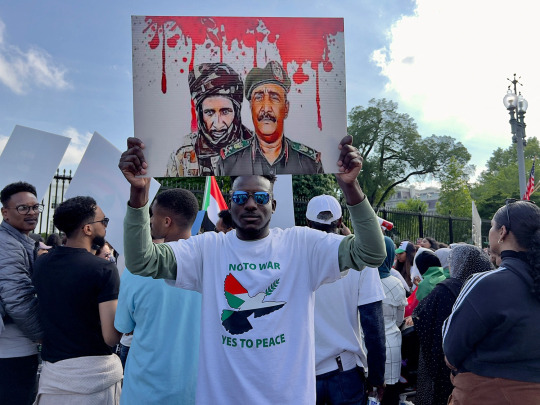
Activists demonstrate in front of the White House in Washington on April 29, calling on the United States to intervene to stop the fighting in Sudan. Daniel Slim/AFP via Getty Images
Top officials in Washington either downplayed or misinterpreted these warning signs, according to six officials and congressional aides familiar with the matter. It wasn’t the first time that Burhan and Hemeti had amassed forces around Khartoum, nor the first time that U.S. interlocutors had to step in to help calm the tensions.
Godfrey and his counterpart from London, Giles Lever, who played key roles in shepherding the December deal to the finish line, left the country on separate vacations by early April, a sign that Washington felt the deal was all but done. Back in Washington, after Burhan and Hemeti signed the agreement, the State Department sent word to Congress that it wanted to ready $330 million in funds to aid Sudan’s democratic transition, according to three congressional aides and officials familiar with the matter. Those officials said the department was drafting a carrot-and-stick plan for Sudan, with the millions of dollars of funding the carrot and new sanctions authorizations a hefty stick.
The State Department had a long-standing Level 4 travel advisory for Sudan, recommending that U.S. citizens “do not travel” there, and sent out one additional security alert, on April 13, advising citizens to avoid Karima in northern Sudan, and barring U.S. government personnel from leaving Khartoum, in light of the “increased presence of security forces.” The United States didn’t issue a broad travel warning urging citizens to leave via commercial air travel, consolidate U.S. government personnel inside Khartoum in the event of a crisis, or order a departure of nonessential personnel as tensions between Burhan and Hemeti reached a boiling point.
“We’re all really questioning why we didn’t do more to prepare for the worst-case scenario,” a third U.S. official said.
Drone footage shows clouds of black smoke over Bahri, also known as Khartoum North, outside Sudan’s capital, in a May 1 video obtained by Reuters.Third-party video via Reuters
On April 15, the tensions between Hemeti and Burhan finally boiled over. The RSF launched what appeared to be a coordinated series of attacks on SAF bases and hammered Khartoum International Airport with gunfire and missiles—effectively cutting off the only viable means of escape in a densely populated city that is hundreds of miles from the coast or nearest border.
At once, the city of some 5 million people became a battle zone. The U.S. Embassy began working frantically to consolidate all its personnel and their families in several key locations. Godfrey, the U.S. ambassador, had rushed back to Khartoum, cutting his vacation short, just before the fighting erupted. RSF fighters carried out wholesale looting and assaults, and SAF troops began bombing sites around Khartoum. RSF fighters assaulted the EU’s ambassador in Khartoum, Aidan O’Hara, and in various other instances reportedly fired on, briefly kidnapped, or sexually assaulted U.N. and international organization workers, according to internal U.N. security reports obtained by Foreign Policy.
The White House, State Department, and Defense Department leaped into crisis mode, working around the clock to draft up embassy evacuation plans. On April 22, a contingent of U.S. troops took off from a U.S. base in Djibouti on three Chinook helicopters and, after refueling in Ethiopia, landed in Khartoum to safely evacuate all U.S. government staff and their families. All the while, top U.S. diplomats worked to arrange temporary cease-fires between Burhan and Hemeti to aid civilians and assist those trying to escape.
“None of the foreign diplomatic missions in Khartoum changed their security posture or staffing levels before the outbreak in fighting, and the U.S. embassy was very focused and effective in consolidating its personnel immediately after the war started,” the State Department spokesperson said.
An estimated 16,000 U.S. citizens remained trapped in the city, including many dual U.S.-Sudanese citizens and a smaller number of NGO and aid workers who worked on U.S.-funded humanitarian and development programs. U.S. lawmakers became infuriated that the Biden administration wasn’t doing more to aid in the evacuation of U.S. citizens after the initial outbreak of the conflict, comparing the fiasco to the ignominious withdrawal from Afghanistan.
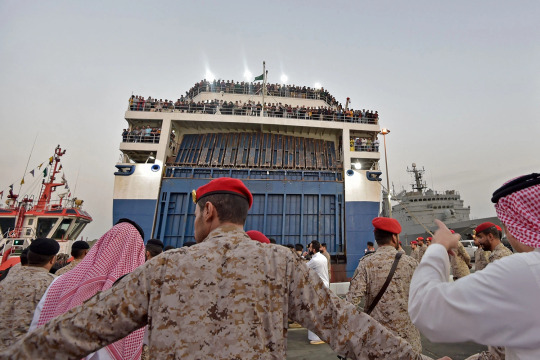
The Saudi-flagged ferry passenger ship Amanah carrying evacuated civilians fleeing violence in Sudan arrives at King Faisal Naval Base in Jeddah, Saudi Arabia, on April 26. Amer Hilabi/AFP via Getty Images
One resident who stayed in Khartoum was Bushra Ibnauf, a dual U.S.-Sudanese citizen and doctor who had moved back to Khartoum from Iowa. “He had a passion for doing good. I remember him saying, ‘I can be replaced in Iowa, but I can’t be replaced in Sudan,’” said Yasir Elamin, the president of the Sudanese American Physicians Association and a close friend and colleague of Ibnauf. Ibnauf and other doctors ventured out amid gunfights and explosions to provide aid to wounded civilians as the conflict dragged on.
Other Sudanese citizens began trying to make their way out of Khartoum, either by fleeing north to the Egyptian border or on a precarious overland journey to the coast at Port Sudan. “It was hell on earth,” recalled one Sudanese activist who escaped Khartoum. “We only left through the city and all the firefights because we were running out of water. Our choice was either definitely die of thirst or maybe get hit by bullets. It was no choice at all.”
U.S. officials have made brokering a sustainable cease-fire their top priority, but so far no cease-fire has held. Both Burhan and Hemeti have sent negotiators to peace talks in Jeddah, Saudi Arabia, coordinated with Washington and Riyadh, but many officials and analysts doubt the talks will lead anywhere after multiple ceasefire attempts failed. On May 4, Biden announced a new executive order granting new legal authorities to impose sanctions on those involved in the violence in Sudan. Some Sudanese analysts doubt sanctions will work.
“The point of sanctions is that it is used as a threat during normal times to prevent bad actors from doing bad things,” said Amgad Fareid Eltayeb, a former assistant chief of staff to Sudanese Prime Minister Abdalla Hamdok before he was ousted from power. “I think right now it’s too little, too late—it’s already a war situation.”
The situation in Khartoum remains dire. “I don’t think so-called safe areas right now are going to be safe for much longer because the aim of the game from both sides seems to be total control of the country,” said Khair, the Sudanese political analyst.

A Sudanese person paints graffiti on a wall during a demonstration in Khartoum on April 14, 2019. Omer Erdem/Anadolu Agency/Getty Images
U.S. lawmakers are pressing for new envoys to enter the fray. Rep. Michael McCaul, the Republican chairman of the House Foreign Affairs Committee, and his Democratic counterpart, Rep. Gregory Meeks, issued a joint appeal to Biden and the U.N. to appoint new U.S. and U.N. special envoys to Sudan, saying that “[d]irect, sustained, high-level leadership from the United States and United Nations is necessary to stop the fighting from dragging the country into a full-blown civil war and state collapse.”
Many Western officials fear that Sudan could plunge into civil war if the fighting isn’t stopped soon, but it’s also unclear what a viable cease-fire would mean for any hopes of reviving the moribund democratic transition in Sudan. “This is not yet a full-scale civil war, à la Syria, à la Libya,” said Feltman, the former U.S. envoy. “It’s still a fight between two rival forces. Now is the time to arrest it, to stop it before it spirals.”
All the while, the fighting in Khartoum continues. Some U.S. citizens have found additional ways to evacuate, either with the direct assistance of the U.S. government or of other countries.
Others weren’t so lucky. Ibnauf, the Sudanese American doctor who stayed in Khartoum to provide succor to civilians amid the fighting, was stabbed to death by suspected looters in front of his family on April 25.
#Sudan#east africa#khartoum#us fighting#colonialism 2023#emergency evacuations#Sudan Crisis: U.S. Missteps Fumbled Hopes for Democracy#failed us policy#Africa
23 notes
·
View notes
Text
Turkey’s recent effort to join South Africa’s genocide case at the International Court of Justice (ICJ) over Israel’s conduct in the Gaza Strip highlights a double standard that is all too common when it comes to the politics of genocide.
The Turkish state has little credibility being an arbiter of what constitutes genocide when it has spent the last 100 years denying the role of the Ottoman Empire in the 1915-16 Armenian genocide, during which more than 1 million Armenians were killed or died of starvation or disease, according to genocide scholars, as they were pushed by the Ottoman Turks out of Anatolia. Turkey refuses to acknowledge or apologize for these events to this day, despite recognition of the genocide by countries such as the United States, France, and Germany.
Ankara’s participation undermines the intent and moral seriousness of South Africa’s charges and highlights the unfettered hypocrisy that characterizes genocide allegations made by many governments. Turkey formally denies that the events of 1915-16 constitute genocide; its participation in many ways weakens the current ICJ case by giving Israel an opening to question the legitimacy of the charges.
For far too long, various governments, from the United States to Turkey to Israel, have leveled (or downplayed) genocide allegations in pursuit of various political objectives. But genocide is not a political football to be tossed around. It is a serious allegation that should never be used for political expediency. But sadly, that is what it has become.
Since the founding of NATO, Turkey has exploited its membership in the alliance to both curry favor with the West and avoid any culpability for its actions. It has used its crucial role within NATO as a bargaining chip to its advantage.
It is one of the reasons why U.S. presidents from both political parties have turned a blind eye to Turkey’s denial of the Armenian genocide by arguing that the country’s proximity to the Soviet Union was strategically valuable to the national interests of the United States. When the Cold War ended, the argument turned to Turkey’s importance as a “free” and “democratic” society in a sea of Islamic fundamentalists.
And over the last 20 years, U.S. presidents have largely overlooked Turkish President Recep Tayyip Erdogan’s rising authoritarianism and egregious regional behavior on the grounds that having Ankara as an ally is strategically important for Washington. This type of transactional diplomacy not only is dangerous but also gives cover to leaders like Erdogan, who feel that they can say or do whatever they want with impunity.
It is unconscionable that Israel, a country founded in the wake of genocide, would deny the Armenian genocide. But that is largely what Israel has done for years—and it is politically motivated. Despite maintaining extensive ties with Turkey, until recently when trade between the countries was suspended, Israel has used the Armenian genocide to needle Ankara when they clash, as they are now over the conflict in Gaza.
Opportunistically referencing a genocide to shame a rival—as Israeli officials did for the first time regarding the Armenian genocide after Turkey decided to support the ICJ case—has no place in international relations. Governments either support a policy of denial or oppose it. There should be no equivocation.
Cherry-picking what represents genocide also sends the wrong message to would-be aggressors who see such vacillation as a green light to act with impunity and evade legal accountability.
It is how former Sudanese President Omar al-Bashir was able to direct the killings of hundreds of thousands of people in the Darfur region in the early 2000s and escape justice—despite being indicted and wanted by the International Criminal Court (ICC) for committing crimes against humanity, war crimes, and genocide. Because various governments did not recognize his acts as genocidal or failed to abide by the ICC indictment, Bashir was for years able to travel freely around the world to visit countries including China, Egypt, and Saudi Arabia as well as Rome Statute signatories such as Jordan, Kenya, Nigeria and, most notably, South Africa—all of which failed to arrest him.
It is how China continues to persecute Uyghurs and other minorities in Xinjiang with few repercussions, even from many Muslim-majority nations, such as Indonesia, Pakistan, and the United Arab Emirates—all of which have rejected a U.N. motion to hold a debate about China’s human rights abuses for political and economic reasons.
And it is how Azerbaijan, one of Turkey’s staunchest allies, has brazenly followed Ankara’s lead in denying the Armenian genocide while seeking to ethnically cleanse Armenians today following its 2023 military offensive in the Nagorno-Karabakh region. Taking a page out of the Turkish playbook, Azerbaijan has been able to leverage political expediency to its benefit by using its vast natural resource wealth, namely oil and gas, to essentially buy a seat at the world’s table as it did when it was named the host country for this year’s U.N. Climate Change Conference.
It is also one of the reasons why Azerbaijan has been able to avoid any punishment from the international community for its mistreatment of ethnic Armenians in Karabakh. While Turkey has deftly used the cover of geopolitics to hide from its genocidal past, Azerbaijan is using global energy demand to obfuscate its own crimes today.
This lack of accountability gives authoritarian leaders and bad actors the wherewithal to ignore international organizations and human rights groups seeking to hold criminals accountable and prevent these types of crimes from happening in the future.
Playing politics with genocide sets a dangerous precedent. It denies victims justice and distracts from the actual merits of the crime. If the international community wants to take genocide seriously, then it must be consistent in its application of the law and its meaning.
81 notes
·
View notes
Text
Jumu'ah Sohbet: 19 January 2024
Subhana'Allah (glory to the Divine) for another providential week at the macro-and-micro level of our worldly existence! Without further adieu, bismillah ...
#1. During our monthly Halaqa (spiritual gathering), where we murids get to practice Rabita (heartfelt connection) and share our insights. Our newly appointed Wakil (Senior trustee) is your Abbu, who was wisely enstated by Shaykha Muzeyyen, who convened this Halaqa. She has equally astutely identified fitting leaders as Khalifa. Shukran Ya Allah (Divine gratitude) for her apt and soulful leadership acumen.
Our Wakil, your Abbu, inadvertently answered my query at its onset, needing clarification as to why we, as Sufis, ought to avoid politics. He referred to how we ought to accept that a plurality of experiences and perspectives exists in the rope and light to Allah. Especially within a Tariqa! We ought to be like As-Shahid (the Witness) and look for the Manifestor in the manifested. Instead of wanting others to comply with our worldview, we must simply get our nafs out of the way so that our focus is automatically on Allah.
He powerfully added an undeniable truth that politics perpetuates power and greed of the nafs, where we are trying to be Allah! Similarly, we have to be wary whether we are trying to be Allah in our responses! Or are we submitting, without taking away the human experience, but where we keep seeking Allah's haq. So whatever is being done incorrectly, we will respond, because there is a Hadith (Prophetic saying) which says we must try to stop a bad action, but if we can't stop it then we should speak out about it and in the least, we must feel the pain in our hearts for its occurrence! That is the Prophetic injunction, but this must not be done in a way where it is hurting the soul of another human being because their essence is also purity and haq!
#2. After Inna's powerful testimony as to how she wrestles her conscience as an original Jewess, but later metamorphosised into a Muslim Sufi. She was led to delete Facebook like me but for different reasons, her out of dismay of the extreme and unapologetic reactions of her cousins, and me out of dismay of my ignorant pre-accident life that unwittingly only celebrated nafs! Your Wakil Abbu beautifully reflected that we continue holding onto the rope of Allah as a community and family. Despite our different perspectives, we choose to be a spiritual family of love, peace, and unity in goodness.
Thereafter, Iliona added a thought-provoking idea that this whole situation with Israel and Palestine has brought her to an existential realisation where every single one of us has in our genetics, the experience of genocide! Every single human is carrying that, and irrespective of the team that are identified as the culprits. The way it can be seen is that it can either inflame one's own genetic pain or it can be treated as a signal to meditate and get over it, if possible. That is because all of our ancestors have done something destructive, and the question becomes about how we put an end to this in our own energy field. That is why we are amongst a family of unity above all else!
Your Wakil Abbu finally reflected that this is a really difficult time for the world, but Shaykh Taner taught us that we are always after the truth. With what is happening around us, are we acting with nafs, or are we acting for truth? What we see around us is human beings' nafs (egos) multipled exponentially, and we're all reacting to the hurt and the pain! We can not shy away from either the pain inflicted by others or responding responsibly, but at the same time, we must constantly search for the Truth, as crafted in my recent poem about the current situation. Shukran Ya Allah, for the blessing of our marriage as a "good cheam," pronounced early on by our late and beloved Shaykh Taner.
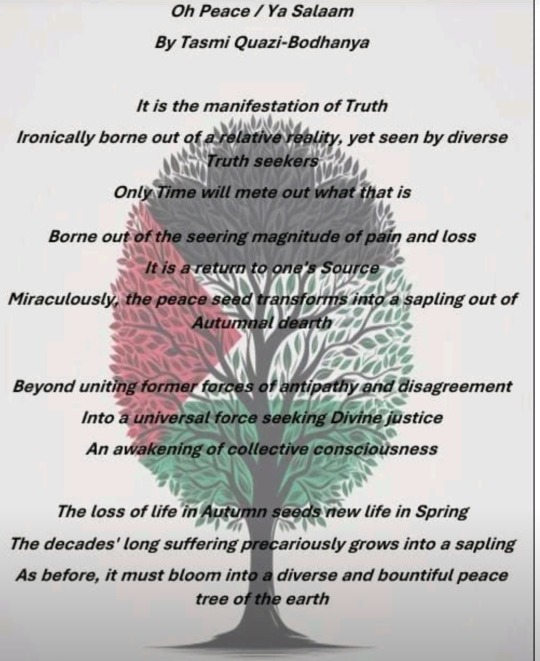
#3. After attempting to counsel a distressed and dear Sudanese friend in the depth of worsening national uncertainty, with the following message:
I just want you to know that I observe the Monday and Thursday fast for Sudan and Palestine. I am confident that Allah will relieve the collective suffering at its divinely ordained time.
My father was a freedom fighter who won Bangladesh's liberation from Pakistan. We have lived in war-torn Iran vs. Iraq, we managed to escape economically declining Zimbabwe, and we have lived through numerous upheavals in South Africa!
Please hang in there!
I realised that the reason that I am naturally attuned to political happenings is because my family has been led to overcome numerous political turmoils! Subhana'Allah for the Divine merit of retrospection, where I learned the following:
- Facing political turmoil is taxing, yes, but they can also shape us into resilient beings.
- My respect for my developing country parents mushroomed for enduring the uncertainties of numerous contexts, Alhamdulillah! Even the inherent racism of Denmark where your Nana was after Iran and the racism that we contended with in post-apartheid South Africa.
- Especially that despite the personally arduous passage of time that we each embarked, we have been blessed to realise what we pray for in:
Ya Wadud Ya Salaam Ya Jami Ya Nafi (Allah's loving and peaceful unity in goodness)
#4. 16 January 2024 marked the third year of our worldly separation with the sweet soul of our spiritual brother Fazeel. I was inspired by Mevlana Rumi to reframe my sadness into something more apt and emancipatory. You see, he was a constant feature of my rehabilitation from our accident.
Just as our beloved Shaykh Taner was unexpectedly taken from us, brother Fazeel was equally unexpectedly taken a short time before that. Immediately after both their passings, I reflected with their other halves that I had wished Allah had taken me instead. However, they both compassionately urged me to trust Allah's hikmah (wisdom / rationale) in spite of their sorrow. This was my inspired ode to him:

Above: A beautiful family photo at their eldest's wedding.
Urs of our Fazeel
In Sufic terms, an urs literally refers to a wedding
A union of the lover with the Beloved
Even though our humble Fazeel is not a Sufi Saint
With his deeply caring heart and his family's subsequent resilience
They attest to our worldly parting with him being his Divine urs
Urs is a death anniversary that is commemorated at a dergah
It's not an occasion to lament but to rejoice
An idea taken from the Hadith:
“Sleep just like the bride.”
And the Angels say to the Pious in the grave, “Sleep with restfulness and comfort just like a bride.”
Beyond Fazeel's incredible heart that was thirsty and ever-ready to serve
Is his equally incredible wife who continued and continues growing
All their children were even inspired to take Divine allegiance
Maintaining a connection to their beloved Daddy
Above all to Al-Hay, as the undying, ever-living, and eternal
#5. Shaykh Anjum reflected on the definition of being considerate, which is "putting others first before ourselves." It was identified as a key requirement for all Sufis as we wrestle with several questions ...
- Will this action bring people together or be divisive?
- Will it be a source of gaining humility or a source of boastfulness?
- Will it clear any assumptions or perpetuate them?
- Will it make people aware or further their ignorance?
- Will it make people appreciative of their bounties or nurture selfishness?
I marvel that when I am least able-bodied and thus less able to be distracted, it is when I can be the most considerate of other's perspectives and experiences of life. Subhana'Allah to reaping the rewards of refining ourselves as Sufis and hence becoming considerate. Anything contrary to this indicates a lack of consideration, being self-centered, ignorant, and caught up in Nafs-al Ammara (at the mercy of one's commanding / impulsive / prompting lower-self).
In conclusion, deep gratitude that your Wakil Abbu reached the cyclone affected shores of Mauritius safely. Insha'Allah, our Mauritian spiritual family, remain safe there, and your Abbu returns to our hearts:
Ya Muhaymin Ya Hafiz
Ya Wadud Ya Salaam Ya Jami Ya Nafi
4 notes
·
View notes
Text
A timeline of the Genocide in Sudan: the Darfur Genocide.
2003 - Soldiers of the military led government in Sudan and their proxy militia, known as Janjaweed (now known as the Rapid Support Forces or RSF) , fought rebel groups in Darfur. The government and Janjaweed forces systematically depopulated land inhabited by Fur, Masellt, and Zogawa communities through forced displacement and violent attacks on civilians. Attacks included the intentional burning of homes, villages, and crops and the systematic destruction of food stores. Among the acts of violence were the looting of relief supplies, killings, and widespread rape. It is estimated that the death toll reached 200,000 with the forced displacement of 2,000,000.
2004 - In 2004, the African Union Mission in Darfur (AMIS) was established to monitor the Humanitarian Ceasefire Agreement signed earlier that year. Partially in response to pressure from human rights advocates, members of the US government were some of the first international figures to label the violence in Darfur a genocide. The UN, the African Union (AU), and the European Union accused the Sudanese government and its allied militias of committing crimes against humanity. However, they disagreed that genocide had occurred.
2005 - In March 2005, the UN Security Council referred the case of Sudan to the International Criminal Court (ICC) for investigation of war crimes, crimes against humanity, and genocide.
Over the course of the genocide in Darfur, a pattern of government-sponsored actions included:
▫️ Backing Janjaweed militias in systematic attacks against civilians from the same ethnic groups as rebel forces
▫️ Bombing civilians from aircrafts
▫️ Committing massive human rights abuses, including murder, rape, and persecution based on race, ethnicity, and religion.
Large-scale government attacks against civilians declined after 2005. However, most of those displaced by the violence did not return home for fear that their villages would be attacked again. Attacks on civilians continued, on a smaller scale, for years.
2006 - African Union and UN efforts to negotiate a permanent settlement expanded in the years following the initial AMIS deployment. The effort resulted in the short-lived Darfur Peace Agreement (DA) in 2006.
2007 - In 2007, the United Nations Security Council authorized a hybrid United Nations-African Union peacekeeping force (UNAMID) to oversee the implementation of the DPA. Throughout its tenure, the force was underfunded and understaffed. It was also vulnerable to attacks from Sudanese government forces and rebel groups alike. These constraints hindered UNAMID's ability to fully implement its mandate to protect civilians in Darfur.
2008 - In July 2008, International Criminal Court (ICC) prosecutor Luis Moreno-Ocampo requested the court issue an arrest warrant for Sudanese President al-Bashir. The ICC charged al-Bashir with crimes against humanity and war crimes for the government's role in orchestrating violence in Darfur.
2019 - A popular uprising in the spring of 2019 resulted in the ouster of Sudanese President Omar Hassan al-Bashir.
2021 - In October 2021, the Sudan Armed Forces (SAF) and the Rapid Support Forces (RSF, also the Janjaweed) staged a military coup and formed a Transitional Military Council (TMC). Despite promises of transition to civilian rule, the TMC undid many of the reforms initiated by the civilian government in 2019. After the October 2021 coup, RSF leaders-especially General Mohamed Hamdan Dagalo "Hemedti"-continued to gain influence as members of the ruling TMC government.
2022- In December 2022, in the face of popular protests, the SAF, RSF, and Sudanese political parties negotiated a deal that would have slowly led to a new civilian administration in Sudan. The RSF, however, rejected the idea of formally integrating into the SAF.
2023 - In April 2023, the RSF attacked SAF positions in Khartoum and key military sites. The attacks sparked yet another wave of violence. In June 2023, the United States Holocaust Memorial Museum warned that Darfur civilians face significant risks of genocide. Several factors point to the risk of genocide. They include systematic attacks by the RSF and allied militias, impunity for past crimes, and new hate speech against marginalized groups. Darfur is undergoing another genocide.
More information on the crisis in Sudan.
All underlined text have links!
4 notes
·
View notes
Text

https://www.reuters.com/world/europe/eu-leaders-seek-deal-fund-ukraine-hungary-digs-heels-2024-02-01/
7 notes
·
View notes